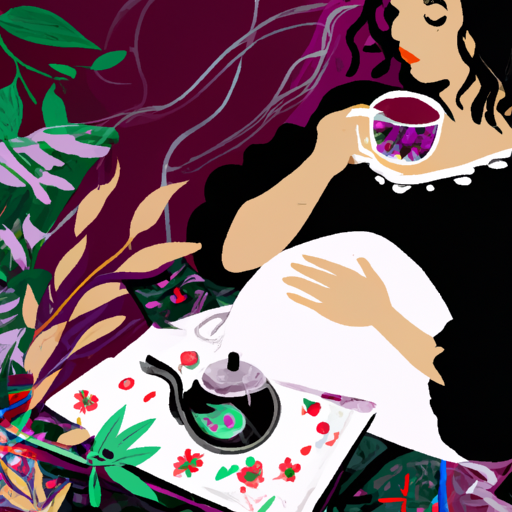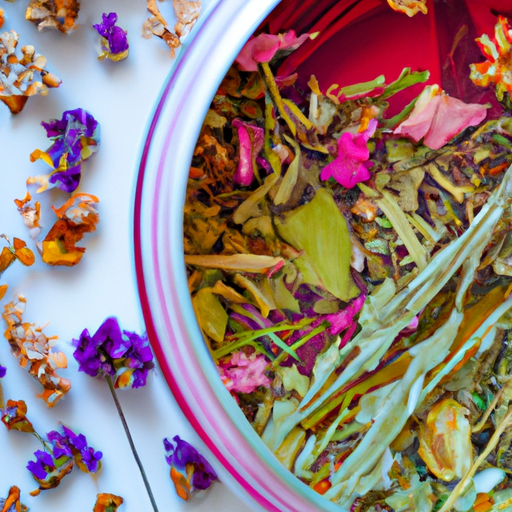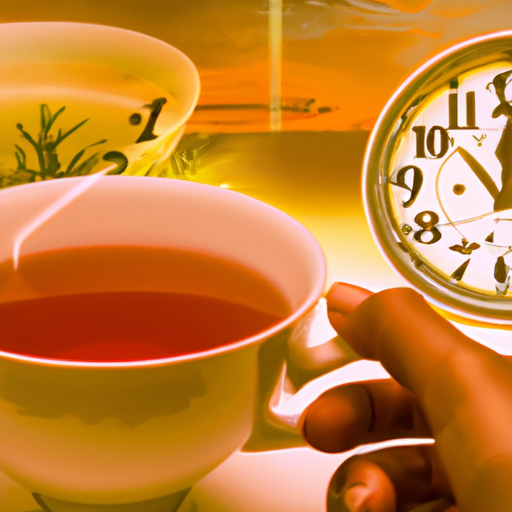Imagine this scenario: you’re seated in a comfortable cafe, enjoying a hot cup of herbal tea, feeling calm and refreshed. Suddenly, you start to wonder – is it safe for me to continue drinking this lovely beverage while pregnant?
It’s a common concern for many expectant mothers, as the safety of herbal tea during pregnancy is often debated. As an avid tea drinker and soon-to-be mom myself, I understand the importance of making informed choices for the health and well-being of both myself and my baby.
That’s why I’ve delved into the world of herbal tea and its impact on pregnancy, so you don’t have to. In this article, we’ll explore the safety of herbal tea during pregnancy, the benefits it can offer, and which herbal teas to avoid.
So grab a cup of tea (decaffeinated, of course!) and let’s dive in!
Key Takeaways
- Safety of herbal tea during pregnancy is debated
- Consult healthcare provider before consuming herbal tea during pregnancy
- Safe herbal teas during pregnancy include chamomile, ginger, peppermint, and raspberry leaf
- Limit caffeine intake during pregnancy to no more than 200 milligrams per day
Understanding Herbal Tea Safety During Pregnancy
So, you’re wondering if you can indulge in a cup of herbal tea while you’re expecting? Well, the answer is both yes and no. While herbal tea can have some benefits during pregnancy, it’s important to understand the potential risks as well.
Certain herbs used in herbal teas may not be safe for pregnant women, as they can stimulate the uterus or cause hormonal imbalances. It’s crucial to consult with your healthcare provider before consuming any type of herbal tea during pregnancy. They’ll be able to guide you on which herbs are safe and which ones to avoid.
In the next section, we’ll discuss the benefits of herbal tea for pregnant women, so you can make an informed decision about whether to include it in your pregnancy routine.
Benefits of Herbal Tea for Pregnant Women
During pregnancy, it’s important to consider the potential advantages of incorporating herbal infusions into your daily routine. Herbal tea can provide a range of benefits for pregnant women, such as relieving nausea, aiding digestion, and promoting relaxation. However, it’s crucial to choose safe herbal teas during pregnancy.
Some herbal teas, like chamomile and ginger, are generally considered safe and can help with morning sickness. Peppermint tea can soothe the digestive system and alleviate bloating. Raspberry leaf tea is known to tone the uterus and can be beneficial during the later stages of pregnancy.
It’s important to consult with your healthcare provider before adding any herbal teas to your routine, as some herbs may have potential risks or interact with medications.
Transitioning to the subsequent section, let’s explore some popular herbal teas that are considered safe for pregnancy.
Popular Herbal Teas Safe for Pregnancy
To make your pregnancy journey even more enjoyable, explore these popular herbal infusions that are completely safe for you and your little one. Herbal teas offer various benefits during pregnancy, including aiding in labor and supporting postpartum recovery. Here are some popular herbal teas that you can safely enjoy:
| Herbal Tea | Benefits |
|---|---|
| Raspberry Leaf | Strengthens the uterus and eases labor |
| Chamomile | Reduces anxiety and promotes relaxation |
| Ginger | Alleviates nausea and aids digestion |
| Peppermint | Relieves indigestion and bloating |
These herbal teas provide numerous advantages for pregnant women. Raspberry leaf tea, for example, strengthens the uterus, making the labor process easier. Chamomile helps reduce anxiety and promotes relaxation, which can be beneficial during pregnancy. Ginger tea is known for alleviating nausea, a common symptom in early pregnancy. Peppermint tea is also helpful in relieving indigestion and bloating. However, it’s important to be aware of which herbal teas to avoid during pregnancy to ensure the safety of both you and your baby.
Herbal Teas to Avoid During Pregnancy
When it comes to herbal teas during pregnancy, there are certain varieties that should be avoided.
These include herbal teas with high caffeine content, such as black tea and green tea, as excessive caffeine intake can have negative effects on both the mother and the baby.
Additionally, herbal teas with stimulant effects, like peppermint and ginseng, should be avoided as they may increase the risk of preterm labor.
Lastly, there are herbal teas with potential risks, such as chamomile and hibiscus, which may cause allergic reactions or interact with certain medications.
Herbal Teas with High Caffeine Content
Although herbal teas may seem like a healthy choice, it’s important to be cautious of those with high caffeine content when pregnant. While some herbal teas can provide relief for morning sickness and contribute to hydration during pregnancy, those with high levels of caffeine should be avoided.
Caffeine is a stimulant that can cross the placenta and affect the baby’s heart rate and growth. It is recommended to limit caffeine intake during pregnancy to no more than 200 milligrams per day, which is equivalent to about one 12-ounce cup of coffee.
Some herbal teas, such as black tea and green tea, contain significant amounts of caffeine and should be consumed in moderation or avoided altogether.
In the next section, we will discuss herbal teas with stimulant effects and their potential impact during pregnancy.
Herbal Teas with Stimulant Effects
Be careful with certain herbal teas, as they can have stimulating effects on your body. While herbal teas are generally safe during pregnancy, it’s important to be aware of which ones may have a stimulant effect. Here are five herbal teas that you should consider avoiding or limiting during pregnancy:
-
Green tea: Although it has many health benefits, green tea contains caffeine and should be consumed in moderation.
-
Peppermint tea: While it can help with digestion, peppermint tea may also have a stimulating effect on the body.
-
Ginseng tea: Known for its energizing properties, ginseng tea should be avoided during pregnancy.
-
Yerba mate tea: This tea contains caffeine and should be consumed in moderation.
-
Licorice tea: It may have a mild stimulant effect and should be consumed in moderation.
If you’re looking for herbal tea alternatives for relaxation during pregnancy, consider chamomile, lavender, or lemon balm tea. These teas are known for their calming properties and can help promote relaxation. However, it’s always best to consult with your healthcare provider before adding any new herbal teas to your pregnancy routine.
Moving on to herbal teas with potential risks…
Herbal Teas with Potential Risks
Now that we’ve discussed herbal teas with stimulant effects, let’s move on to herbal teas with potential risks.
It’s important to have a thorough understanding of the potential risks associated with consuming herbal tea during pregnancy. While some herbal teas are considered safe for pregnant women, others may pose certain risks and should be avoided or consumed with caution.
It’s crucial to follow the precautions and guidelines provided by healthcare professionals when it comes to herbal tea consumption during pregnancy. Some herbal teas may have an impact on fetal development, so it’s essential to make informed choices.
With that in mind, let’s now delve into the next section about preparing and brewing herbal tea safely.
Preparing and Brewing Herbal Tea Safely
When it comes to enjoying herbal tea during pregnancy, it’s important to know how to safely prepare and brew it. Here are three key points to keep in mind:
-
Use fresh, high-quality ingredients: Opt for organic herbs and tea leaves to ensure they’re free from harmful pesticides. Avoid using old or expired herbs as they may have lost their potency.
-
Proper steeping techniques: Follow the instructions on the herbal tea blend packaging for the correct steeping time and water temperature. Over-steeping can result in a stronger brew, which may not be suitable during pregnancy.
-
Safe brewing practices: Ensure that all utensils and containers used for brewing are clean and free from any residue. Use filtered water to avoid any potential contaminants.
By following these guidelines, you can safely enjoy herbal tea during pregnancy. However, it’s important to listen to your body and practice moderation.
Listening to Your Body and Practicing Moderation
Trust your instincts and listen to what your body’s telling you, because sometimes a little moderation goes a long way. When it comes to drinking herbal tea during pregnancy, it’s important to trust your cravings and navigate your food and drink choices wisely.
While herbal teas can have various health benefits, it’s crucial to keep in mind that not all herbal teas are safe for pregnant women. Some herbs may stimulate the uterus or have other potential side effects that could be harmful to you and your baby. It’s always a good idea to consult with your healthcare provider before incorporating any new herbal teas into your pregnancy routine.
Remember, moderation is key, and it’s important to be mindful of the ingredients in the herbal teas you choose. By being informed and making smart choices, you can enjoy herbal teas safely during pregnancy.
Moving on to the conclusion and final thoughts, it’s important to consider the overall impact of herbal tea and maintain a balanced approach to your pregnancy diet.
Conclusion and Final Thoughts
In summary, it’s essential to exercise caution and seek professional advice when exploring the world of herbal teas during pregnancy. Understanding the research and consulting with healthcare professionals are crucial steps to ensure the safety of both the mother and the baby.
While herbal teas can provide some benefits, not all herbal teas are safe for pregnant women. Some herbal teas may contain ingredients that could potentially harm the fetus or cause complications during pregnancy. It is important to thoroughly research the specific herbal tea and its ingredients before consuming it.
Additionally, consulting with healthcare professionals, such as your obstetrician or midwife, can provide valuable guidance and recommendations based on your individual circumstances. They can help determine which herbal teas are safe to consume during pregnancy and in what moderation.
Ultimately, prioritizing the health and well-being of both mother and baby should be the main focus when considering herbal tea consumption during pregnancy.
Frequently Asked Questions
Can I drink any type of herbal tea during pregnancy?
During pregnancy, it’s important to explore alternative caffeine-free drinks. However, consuming herbal tea comes with potential risks. Some herbal teas may be safe, but many contain ingredients that could harm the baby.
Are there any herbal teas that are especially beneficial for pregnant women?
There are several herbal teas that are especially beneficial for pregnant women. Some of the best herbal teas for pregnancy include ginger tea for nausea, raspberry leaf tea for uterine health, and chamomile tea for relaxation.
How can I ensure that I am brewing and preparing herbal tea safely during pregnancy?
To ensure safe preparation of herbal tea during pregnancy, I follow recommended brewing techniques. Some herbal teas, like ginger or chamomile, are considered safe. It’s important to consult with a healthcare professional for personalized advice.
What are some signs that my body may be reacting negatively to herbal tea during pregnancy?
If herbal tea during pregnancy starts giving me butterflies in my stomach, it’s a red flag. Other signs of a negative reaction could include nausea, headaches, or allergic reactions. The risks of consuming herbal tea while pregnant should not be taken lightly.
Is it safe to consume herbal tea in moderation throughout my entire pregnancy?
It is generally safe to consume herbal tea in moderation throughout pregnancy, but there are potential risks. It is important to consult with a healthcare provider for specific recommendations. Alternatives like caffeine-free tea or warm water with lemon are also good options.
Conclusion
In conclusion, herbal tea can be a safe and beneficial choice for pregnant women, as long as certain precautions are taken. It’s important to choose herbal teas that are known to be safe during pregnancy and to avoid those that may have potential risks. By preparing and brewing the tea safely and listening to your body’s signals, you can enjoy the benefits of herbal tea while pregnant. Remember, moderation is key. As the saying goes, "Everything in moderation, including herbal tea."










